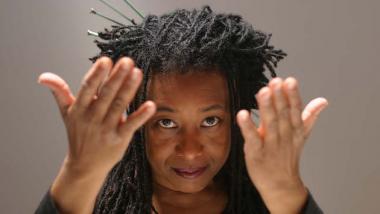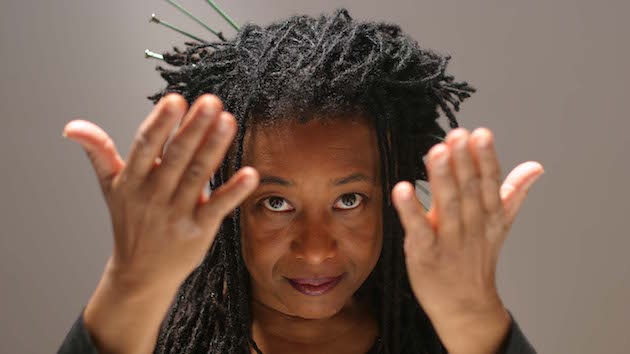
Pamela Z doesn’t come across like everyone’s stereotype of an electronics wizard. She’s extremely communicative and her groundbreaking, beautiful compositions and performances are based on layers of lucid communication, from the speech that gives rise to the musical ideas, to the graceful gestures with which she used to trigger processors and tape delays, to the lovely singing voice and her way of synthesizing experience in enlightening ways. It’s no wonder that she’s “having her moment,” it’s just that it’s happening in a way that she couldn’t foresee.
Because Pamela Z is a composer and performer, she writes for herself, mainly. In such pieces as The Schmetterling (1998), Wunderkabinet (2005), Baggage Allowance (2010), and Memory Trace (2015), Z made electronica performance into a natural extension of the way artists could explore the contemporary world, mirroring its complexity in layers of sound that helped make her point, rather than being the point. And all of this seems an extension of her inquisitive mind that, even in conversation is making unexpected connections. She’s always been busy, and in the world of new music/ electronica she’s been a known quantity for years.
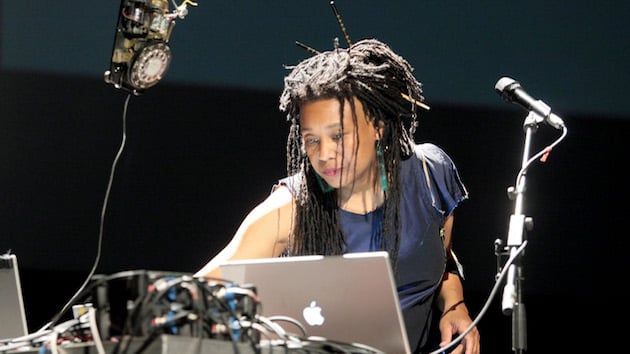
But then, a couple of years ago, instead of an occasional commission from an outside organization (like Bang on a Can, which commissioned Schmetterling), the commissions started to ramp up:
“I just woke up one day and said, ‘I guess this is what I do.’ I don’t know exactly why that is. I guess, for me, I wonder — for other people that’s just, like, normal, but I guess I wonder what caused it to suddenly ...?”
When I suggest that it was SFCV, she laughs. “Yeah, that’s it,” she says. “It was your reviews.”
Now, she’s “classical famous.” And then there’s the fellowship from the American Academy in Rome, which she first applied for 12 years ago. She won it in 2019. It’s hard to fathom the past year, for her, as it is for all of us. But it happened to interrupt a year in which Z was deluged with commissions, including, as it happens, one from soprano Julia Bullock, named last year an artistic partner with the San Francisco Symphony, whose recital including a work from Pamela Z was scheduled for Juneteenth of this year.
Tell us how the Rome Prize fellowship came about.
I did the application process in the fall of ’18; is that right? In early ’19 they wrote me and said, ‘You’ve been shortlisted and now we want to fly you to New York and interview you.’ And so then I was like ‘Whaaat?’ And one of the crazy things about the Rome Prize is the cycle that it’s on, I guess it’s kind of like an academic [calendar]. But they select you in spring and inform you in spring, so I found out at the end of February that I was going to need to be away for a year, starting in fall. And I don’t even understand how that can work for people!
And so then I had to sublet my studio and figure it all out and apply for visas and do the whole thing, and by September I was on my way to Rome.
What was the project that you suggested to them?
The project that I had applied with was a piece called Simultaneous. It was going to be a piece about simultaneity and synchronicity. It was going to be a full evening performance work, like a multimedia song cycle. Kind of on the scale of Carbon Song Cycle [2012, scored for a chamber ensemble with multimedia layers, including immersive video projections.] My idea was that I was going to create all these interviews with people and use the sound from those to build the piece and that I was going to build this performance and create video material that would be interactive. I was interested in focusing on simultaneity from a lot of different angles, everything from simultaneous translations, which I have always found super fascinating and kind of impressive, and also just synchronicity — the idea of things happening in different geographic locations at the same time or two people who find out they had the exact same experience, things like that. I was also just thinking about this plague of multitasking that more and more we’re all expected to be doing 100 things at one time.
And so I was exploring those ideas. And when I got to Rome, in the fall, I started doing the interviews and I basically interviewed all of the other fellows. And I started to work on the piece, but then I had also been accepted by the Academy to have a piece in this annual art exhibition that they have called Cinque Mostri [Five exhibits]. So I decided that I would create a 21-channel sound installation based on the material from the interviews and then after I was finished I would move into working on the performance piece. And so I made the sound installation and then COVID-19 hit and everything went sideways.
Do you have to finish the piece or not?
My assumption is that I don’t have to do anything. I want to finish the piece and I have to finish at least a version of it because now I’ve agreed with a German radio network, Deutschland Radio, to make a radio version of it. And I actually had a booking for the performance; it was going to premiere at MOMA in New York, kind of in my last Rome Prize month. I was going to fly back in June and perform the piece and then go back and finish my fellowship in Rome. And then everything was canceled. And MOMA did not give me any kind of a date in the future, but my assumption is the piece will still happen. But MOMA was kind enough to pay me my performance fee even though it didn’t happen. So I will eventually finish the performance piece and hopefully perform it at MOMA and other places.
Among her recent spate of commissions is a work for LA-based chamber orchestra Kaleidoscope; a piece for piano/ violin duo Sarah Cahill and Kate Stenberg, featuring Z herself; two micro-commissions by Eighth Blackbird and the Del Sol String Quartet that the groups plan to auction off as part of a fundraiser; a piece for LA-based pianist Nadia Shpachenko, plus the work for Bullock.
What else are you working on?
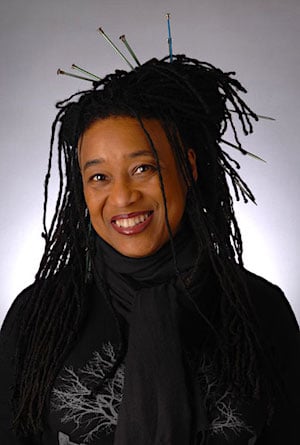
For Innova, I was supposed to record a record. It’s been a really long time since I’ve put out a solo album [A Delay is Better, 2004, following on 2001’s groundbreaking Immersion.] I’ve been in conversation with Philip Blackburn, but then I got the Rome Prize and now I’m like, “Is there a way that I can do this in between all these commissions?” I do not want to sound complaining. I feel really bad for people who have no work. Because I was getting paid; I’ve had a lot of premieres and performances of my work postponed; but the commissions themselves still stand.
I just finished one piece for cellist Amanda Gookin, who has this commissioning project called the Forward Music Project. That was going to premiere at the Park Avenue Armory in May and I was struggling to finish that while I was in Rome and suddenly I was not in Rome and I thought that the concert wasn’t going to happen anymore, so I thought I was home free for that one.
And then, the Park Avenue Armory has decided that they want to do an online screening of those commissions, and so I suddenly had to complete that score. And I not only had to finish the piece, but I also had to produce a high-quality recorded version of it. So I sent fragments of the score to Amanda; she recorded them and then sent them back to me, then I had to put them in ProTools and create the recording and then Amanda has a video artist that she works with and so I was sending the recording to her and she was making the video and we finished the piece and it sounds beautiful, but it was crazy.
I wrote it so that she could play one layer and then looping herself and playing the next layer on top of that. But with this fixed media version of it, I layered all the parts myself in ProTools. And then we realized that there was an intonation problem because she was playing them blind, not hearing the other layers. And so then we had to go back and forth and fix the intonation. It was a big project, but we sort of powered through it.
I think that Julia Bullock created her project by herself?
She got in touch with me. I received an email and we’ve been back and forth, me and the other people she selected, about the project and how it was going to work. That was the first thing to be postponed.
She’s very politically motivated, and I don’t mean that in a superficial way.
I remember when I first got the commission from her and there were all these slave narratives that she wanted to use. And I was a little bit hesitant, because I didn’t know how comfortable I was in making a piece like that. But then I thought about how I make these scores for Flyaway Productions, the dance company, for Jo Kreiter. And all her pieces are very political. So every piece I’ve ever made for her was either about labor or about women’s rights, or the right to protest, or incarceration; her work is always that way. And I find that when somebody else is driving that narrative and they just deliver me an assignment then I find that intriguing and I actually enjoy working that way. So Julia’s sending me all this material that’s coming from, I think, poetry that was written by incarcerated people and so I feel like there’s so much material there I’m sure I can find something that is musical, that will spark something from me. So I’m looking forward to working on her piece.
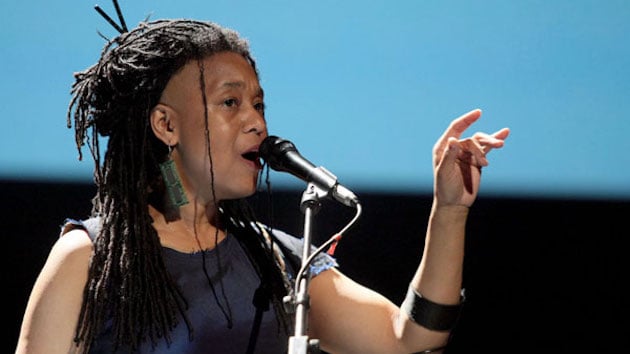
If this year seems strange to the rest of us, imagine how it was for an artist who was sent home from Rome, when the pandemic was raging unchecked in northern Italy, coming to the U.S., where it was uncontrolled, watching the arts season melt away in the process, and yet somehow being preserved by the unlooked-for changes in how her career has shaped up.
Can you share some insights on your experience in Rome?
Time is so strange now. Just that period from the end of February through March literally every day there was something. At first it was just incremental little things, like the way the dining hall was handled. Like every day, we’d come down and there’d be a new rule about how something was different. And this was when nobody knew how long this was going to go on or how serious it was.
And so the first thing was there was hand sanitizer outside the door and you were required to use it before you went in. The next day, the wine bottles and water bottles weren’t on the table and we weren’t allowed to pour our own. The kitchen staff had to run around to us whenever we wanted another glass. The next day, the serving utensils were removed from the buffet and we weren’t allowed to serve our own food. We had to line up and the kitchen staff was like the lunch ladies in high school. The next day we came in and every other chair had been removed and we all had to sit further apart from each other.
And it just went on like that every day. And then it started to get more and more drastic and suddenly the Italian government said all bars and restaurants must close and our bar and our dining hall were technically considered to be a restaurant, so suddenly, there was no food. And they moved us out of the main building and separated us and put us in apartments in surrounding buildings and we all had to go to the grocery store and buy food and make our own food. And then after all these changes and them trying to figure out how to keep us all safe but let us still be there; then, after we all went out and bought like three weeks of groceries, so we wouldn’t have to go often to the grocery store; then suddenly they were like, “You know what? Actually, we have to close, and you guys have to go home. And we were sent packing.
It’s no wonder that, when I asked her about George Floyd and the summer of protest, Z had little time for the people wanting her to volunteer to sit on panels or give talks about what it’s like to be a Black artist. She literally doesn’t have any time. And that’s not what motivates her anyway. Perhaps, like Michelle Obama, she just hates politics. More likely, it’s just that keeping her distance from our particularly disastrous politics is part of keeping the flow, keeping her creativity at full boil. In her own, eventful 2020, the music is uninterrupted, even if the venue is still unknown.

